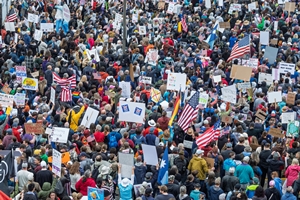This coming Saturday, in towns and cities across America, ordinary citizens will take to the streets. They’ll march against deportations, against creeping authoritarianism, and for the simple belief that dignity belongs to everyone. Yet instead of engaging with their message, Trump and radical right Republicans have already reached for a familiar boogeyman: Antifa. This is a dangerous distortion, one that trades truth for fear and civic engagement for conspiracy.
Despite repeated claims, there is no verified evidence that Antifa is leading or has organized this or any other recent protest. These movements are driven by local coalitions, faith groups, labor unions, students, and families, who act out of conscience, not coercion.
Labeling dissent as “Antifa” serves a clear purpose: it delegitimizes protest by painting it as violent, foreign, or anarchic while opening the door to legitimize force to put down opposition. This tactic echoes historical patterns: from branding civil rights leaders as communists to accusing labor organizers of Bolshevism. It’s a rhetorical sleight of hand designed to silence opposition without addressing its substance.
🪧 From Liberty Trees to Protest Lines—A Legacy of Resistance
Long before Antifa became a political flashpoint, colonial America had its own decentralized movement of anti-authoritarian agitators: the Sons of Liberty.
Founded in the 1760s, this loosely organized network of activists opposed British tyranny, especially taxation without representation. They operated without formal leadership, coordinated across colonies, and used direct action to challenge imperial power. Their tactics included public demonstrations, boycotts, and property destruction, most famously the Boston Tea Party.
British loyalists called them dangerous. Newspapers branded them anarchists. But history remembers them as patriots.
Today, Antifa is cast in a similar mold, accused of chaos, feared for its anonymity, and invoked to discredit broader movements. Yet like the Sons of Liberty, its presence often reflects a deeper truth: that resistance to injustice isn’t always neatly packaged. It can be messy, passionate, and born from moral urgency.
To scapegoat Antifa is to ignore this legacy. And to dismiss modern protest as illegitimate is to forget that America itself was born in defiance.
Sensational claims about Antifa often dominate headlines, drowning out the voices of actual organizers. This distortion fuels public fear, erodes trust in democratic action, and shifts focus away from the policies being protested, whether it’s immigration enforcement or threats to democratic norms.
Yes, some individuals sympathetic to anti-fascist ideals may attend these events. But that’s not coordination. It’s participation. To conflate the two is to confuse presence with control and ideology with orchestration.
When we scapegoat Antifa, we don’t just mislabel a movement. We misjudge our neighbors. The people in the streets are not radicals imported from elsewhere. They are teachers, nurses, veterans, and students. They are America. And their voices deserve to be heard, not dismissed through fear-mongering.
